The Impact of Climate Change on Global Health: A Detailed Report
VerifiedAdded on 2023/06/10
|9
|2820
|112
Report
AI Summary
This report provides a comprehensive analysis of global health challenges, particularly focusing on the impact of climate change. It delves into the interaction between socio-cultural and socio-spatial factors, such as religion, culture, education, healthcare access, migration, and urbanization, and their influence on health outcomes. The report examines the effects of climate change on various aspects of life, including water and food scarcity, extreme weather events, economic losses, and the spread of diseases. It also discusses the roles of key organizations like the World Health Organization (WHO) and the Intergovernmental Panel on Climate Change (IPCC) in addressing these challenges. Furthermore, the report explores the impact of climate change on specific issues like green spaces, migration patterns, economic activity, and religious affiliations, highlighting the need for effective policies and interventions to mitigate the adverse effects of climate change on global health. The report concludes by emphasizing the need for proactive measures to safeguard the health and well-being of populations worldwide.
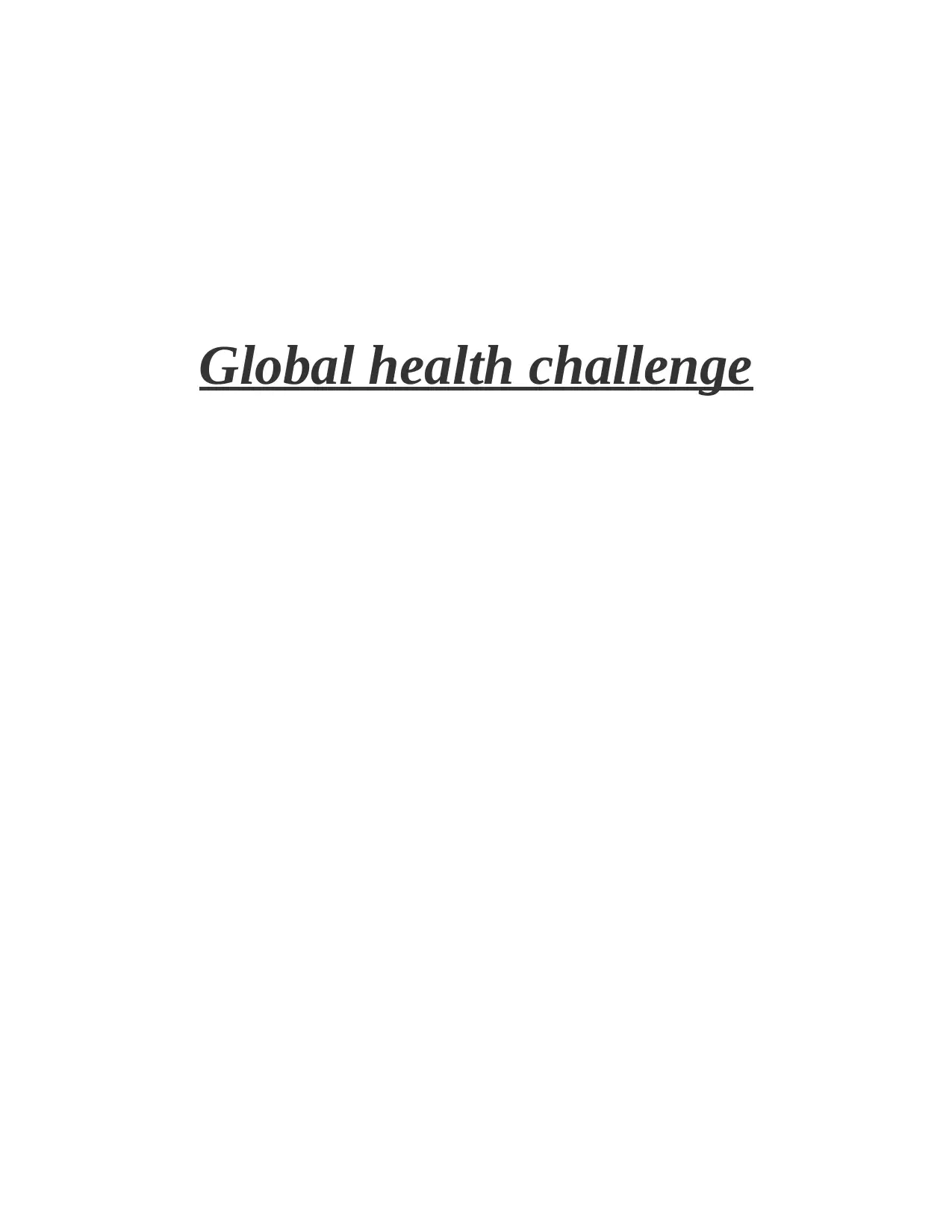
Global health challenge
Paraphrase This Document
Need a fresh take? Get an instant paraphrase of this document with our AI Paraphraser
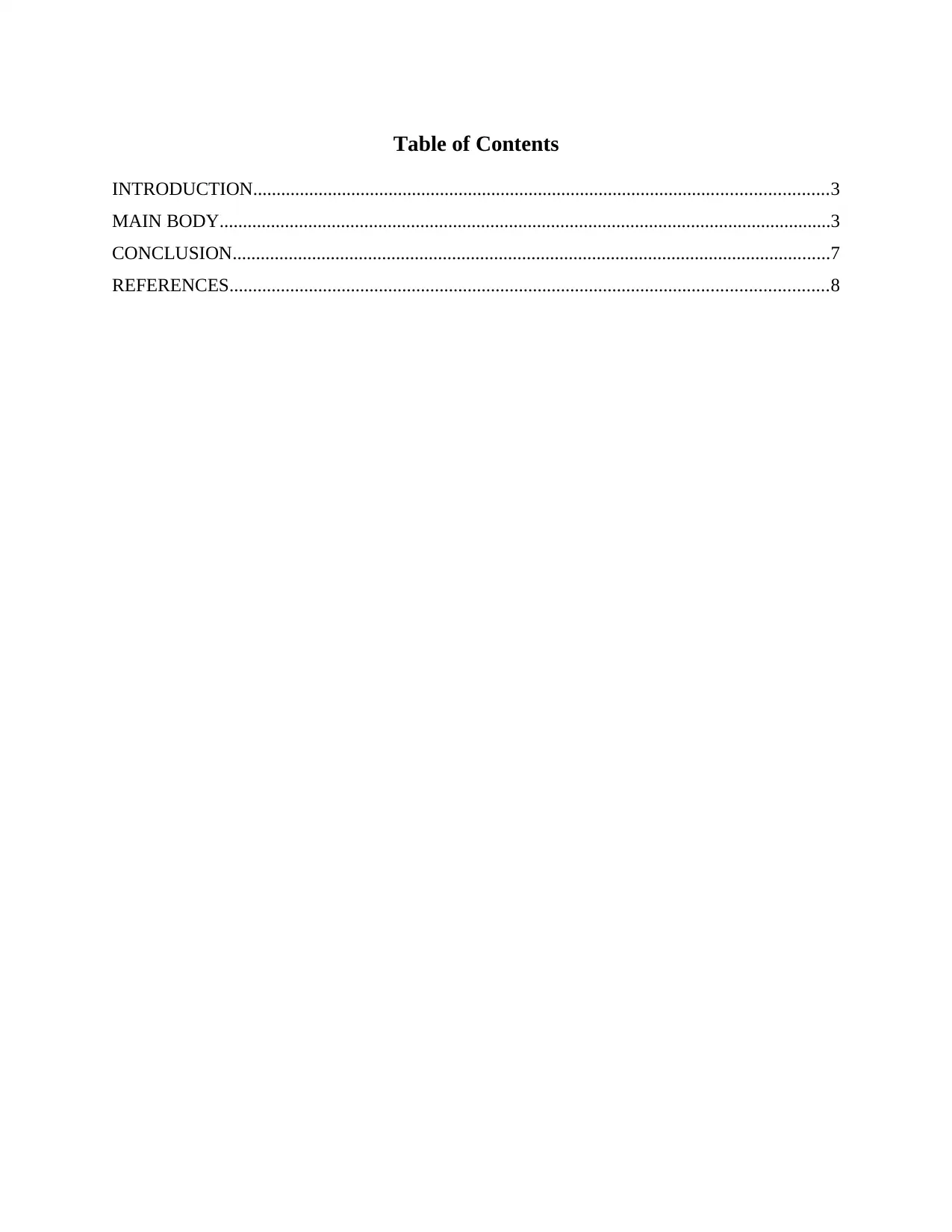
Table of Contents
INTRODUCTION...........................................................................................................................3
MAIN BODY...................................................................................................................................3
CONCLUSION................................................................................................................................7
REFERENCES................................................................................................................................8
INTRODUCTION...........................................................................................................................3
MAIN BODY...................................................................................................................................3
CONCLUSION................................................................................................................................7
REFERENCES................................................................................................................................8
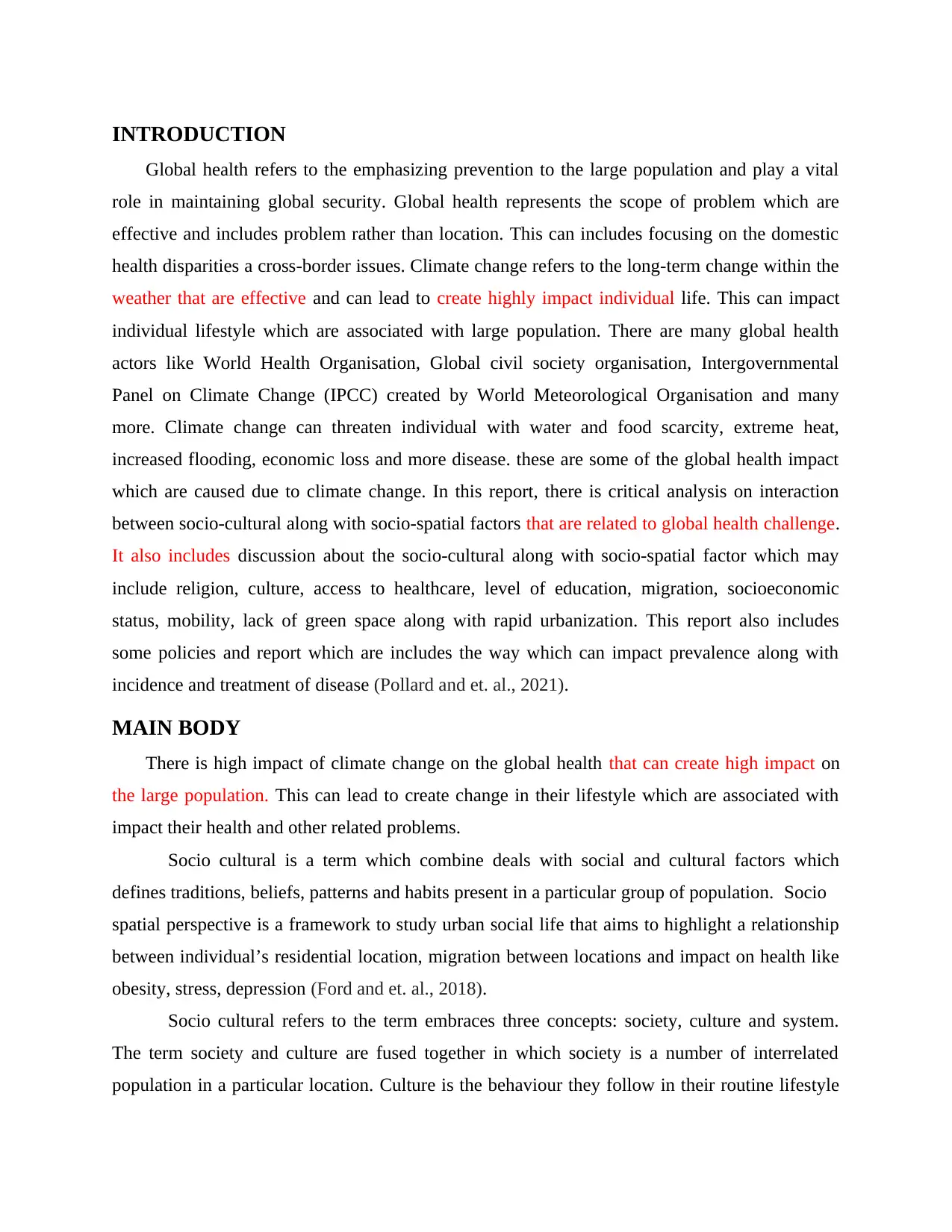
INTRODUCTION
Global health refers to the emphasizing prevention to the large population and play a vital
role in maintaining global security. Global health represents the scope of problem which are
effective and includes problem rather than location. This can includes focusing on the domestic
health disparities a cross-border issues. Climate change refers to the long-term change within the
weather that are effective and can lead to create highly impact individual life. This can impact
individual lifestyle which are associated with large population. There are many global health
actors like World Health Organisation, Global civil society organisation, Intergovernmental
Panel on Climate Change (IPCC) created by World Meteorological Organisation and many
more. Climate change can threaten individual with water and food scarcity, extreme heat,
increased flooding, economic loss and more disease. these are some of the global health impact
which are caused due to climate change. In this report, there is critical analysis on interaction
between socio-cultural along with socio-spatial factors that are related to global health challenge.
It also includes discussion about the socio-cultural along with socio-spatial factor which may
include religion, culture, access to healthcare, level of education, migration, socioeconomic
status, mobility, lack of green space along with rapid urbanization. This report also includes
some policies and report which are includes the way which can impact prevalence along with
incidence and treatment of disease (Pollard and et. al., 2021).
MAIN BODY
There is high impact of climate change on the global health that can create high impact on
the large population. This can lead to create change in their lifestyle which are associated with
impact their health and other related problems.
Socio cultural is a term which combine deals with social and cultural factors which
defines traditions, beliefs, patterns and habits present in a particular group of population. Socio
spatial perspective is a framework to study urban social life that aims to highlight a relationship
between individual’s residential location, migration between locations and impact on health like
obesity, stress, depression (Ford and et. al., 2018).
Socio cultural refers to the term embraces three concepts: society, culture and system.
The term society and culture are fused together in which society is a number of interrelated
population in a particular location. Culture is the behaviour they follow in their routine lifestyle
Global health refers to the emphasizing prevention to the large population and play a vital
role in maintaining global security. Global health represents the scope of problem which are
effective and includes problem rather than location. This can includes focusing on the domestic
health disparities a cross-border issues. Climate change refers to the long-term change within the
weather that are effective and can lead to create highly impact individual life. This can impact
individual lifestyle which are associated with large population. There are many global health
actors like World Health Organisation, Global civil society organisation, Intergovernmental
Panel on Climate Change (IPCC) created by World Meteorological Organisation and many
more. Climate change can threaten individual with water and food scarcity, extreme heat,
increased flooding, economic loss and more disease. these are some of the global health impact
which are caused due to climate change. In this report, there is critical analysis on interaction
between socio-cultural along with socio-spatial factors that are related to global health challenge.
It also includes discussion about the socio-cultural along with socio-spatial factor which may
include religion, culture, access to healthcare, level of education, migration, socioeconomic
status, mobility, lack of green space along with rapid urbanization. This report also includes
some policies and report which are includes the way which can impact prevalence along with
incidence and treatment of disease (Pollard and et. al., 2021).
MAIN BODY
There is high impact of climate change on the global health that can create high impact on
the large population. This can lead to create change in their lifestyle which are associated with
impact their health and other related problems.
Socio cultural is a term which combine deals with social and cultural factors which
defines traditions, beliefs, patterns and habits present in a particular group of population. Socio
spatial perspective is a framework to study urban social life that aims to highlight a relationship
between individual’s residential location, migration between locations and impact on health like
obesity, stress, depression (Ford and et. al., 2018).
Socio cultural refers to the term embraces three concepts: society, culture and system.
The term society and culture are fused together in which society is a number of interrelated
population in a particular location. Culture is the behaviour they follow in their routine lifestyle
⊘ This is a preview!⊘
Do you want full access?
Subscribe today to unlock all pages.

Trusted by 1+ million students worldwide
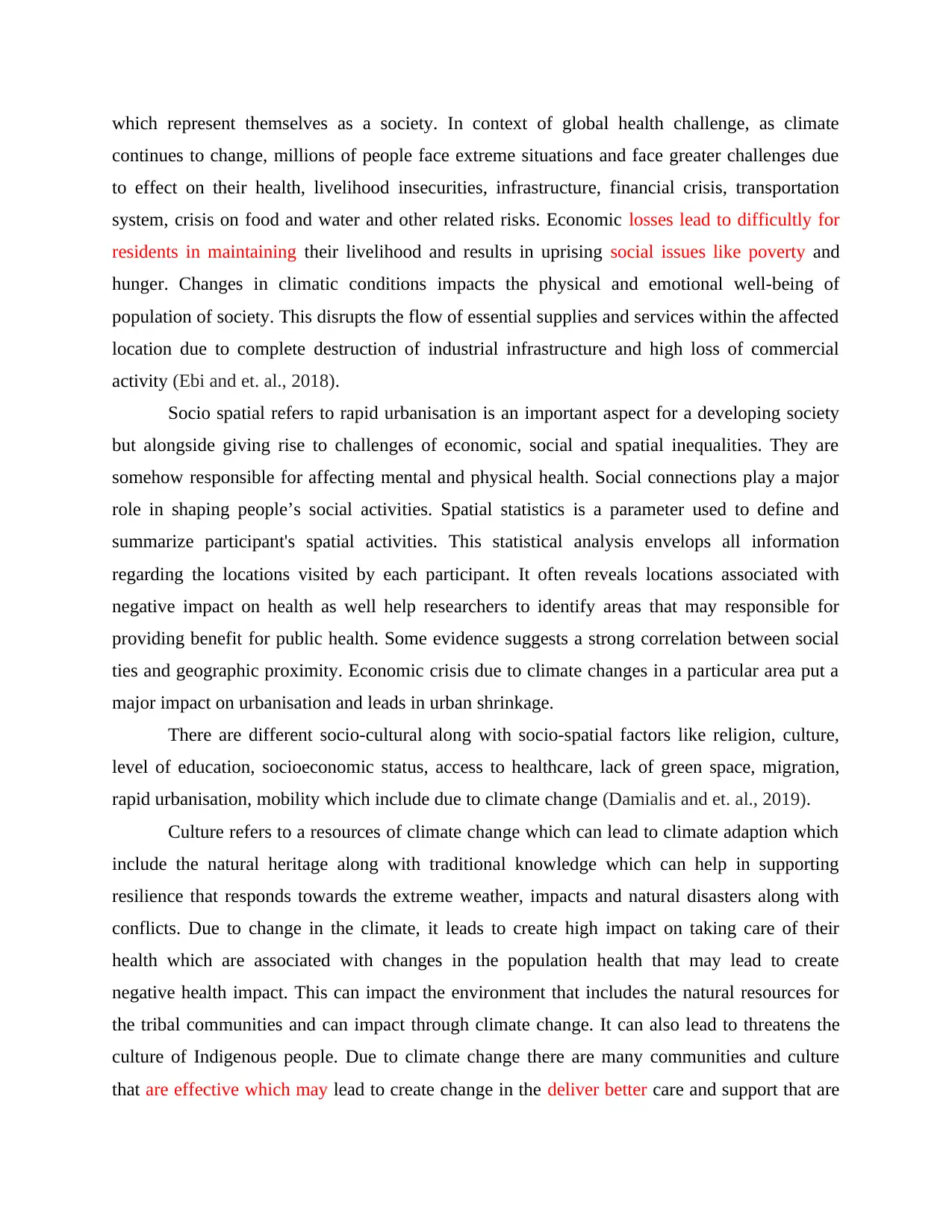
which represent themselves as a society. In context of global health challenge, as climate
continues to change, millions of people face extreme situations and face greater challenges due
to effect on their health, livelihood insecurities, infrastructure, financial crisis, transportation
system, crisis on food and water and other related risks. Economic losses lead to difficultly for
residents in maintaining their livelihood and results in uprising social issues like poverty and
hunger. Changes in climatic conditions impacts the physical and emotional well-being of
population of society. This disrupts the flow of essential supplies and services within the affected
location due to complete destruction of industrial infrastructure and high loss of commercial
activity (Ebi and et. al., 2018).
Socio spatial refers to rapid urbanisation is an important aspect for a developing society
but alongside giving rise to challenges of economic, social and spatial inequalities. They are
somehow responsible for affecting mental and physical health. Social connections play a major
role in shaping people’s social activities. Spatial statistics is a parameter used to define and
summarize participant's spatial activities. This statistical analysis envelops all information
regarding the locations visited by each participant. It often reveals locations associated with
negative impact on health as well help researchers to identify areas that may responsible for
providing benefit for public health. Some evidence suggests a strong correlation between social
ties and geographic proximity. Economic crisis due to climate changes in a particular area put a
major impact on urbanisation and leads in urban shrinkage.
There are different socio-cultural along with socio-spatial factors like religion, culture,
level of education, socioeconomic status, access to healthcare, lack of green space, migration,
rapid urbanisation, mobility which include due to climate change (Damialis and et. al., 2019).
Culture refers to a resources of climate change which can lead to climate adaption which
include the natural heritage along with traditional knowledge which can help in supporting
resilience that responds towards the extreme weather, impacts and natural disasters along with
conflicts. Due to change in the climate, it leads to create high impact on taking care of their
health which are associated with changes in the population health that may lead to create
negative health impact. This can impact the environment that includes the natural resources for
the tribal communities and can impact through climate change. It can also lead to threatens the
culture of Indigenous people. Due to climate change there are many communities and culture
that are effective which may lead to create change in the deliver better care and support that are
continues to change, millions of people face extreme situations and face greater challenges due
to effect on their health, livelihood insecurities, infrastructure, financial crisis, transportation
system, crisis on food and water and other related risks. Economic losses lead to difficultly for
residents in maintaining their livelihood and results in uprising social issues like poverty and
hunger. Changes in climatic conditions impacts the physical and emotional well-being of
population of society. This disrupts the flow of essential supplies and services within the affected
location due to complete destruction of industrial infrastructure and high loss of commercial
activity (Ebi and et. al., 2018).
Socio spatial refers to rapid urbanisation is an important aspect for a developing society
but alongside giving rise to challenges of economic, social and spatial inequalities. They are
somehow responsible for affecting mental and physical health. Social connections play a major
role in shaping people’s social activities. Spatial statistics is a parameter used to define and
summarize participant's spatial activities. This statistical analysis envelops all information
regarding the locations visited by each participant. It often reveals locations associated with
negative impact on health as well help researchers to identify areas that may responsible for
providing benefit for public health. Some evidence suggests a strong correlation between social
ties and geographic proximity. Economic crisis due to climate changes in a particular area put a
major impact on urbanisation and leads in urban shrinkage.
There are different socio-cultural along with socio-spatial factors like religion, culture,
level of education, socioeconomic status, access to healthcare, lack of green space, migration,
rapid urbanisation, mobility which include due to climate change (Damialis and et. al., 2019).
Culture refers to a resources of climate change which can lead to climate adaption which
include the natural heritage along with traditional knowledge which can help in supporting
resilience that responds towards the extreme weather, impacts and natural disasters along with
conflicts. Due to change in the climate, it leads to create high impact on taking care of their
health which are associated with changes in the population health that may lead to create
negative health impact. This can impact the environment that includes the natural resources for
the tribal communities and can impact through climate change. It can also lead to threatens the
culture of Indigenous people. Due to climate change there are many communities and culture
that are effective which may lead to create change in the deliver better care and support that are
Paraphrase This Document
Need a fresh take? Get an instant paraphrase of this document with our AI Paraphraser
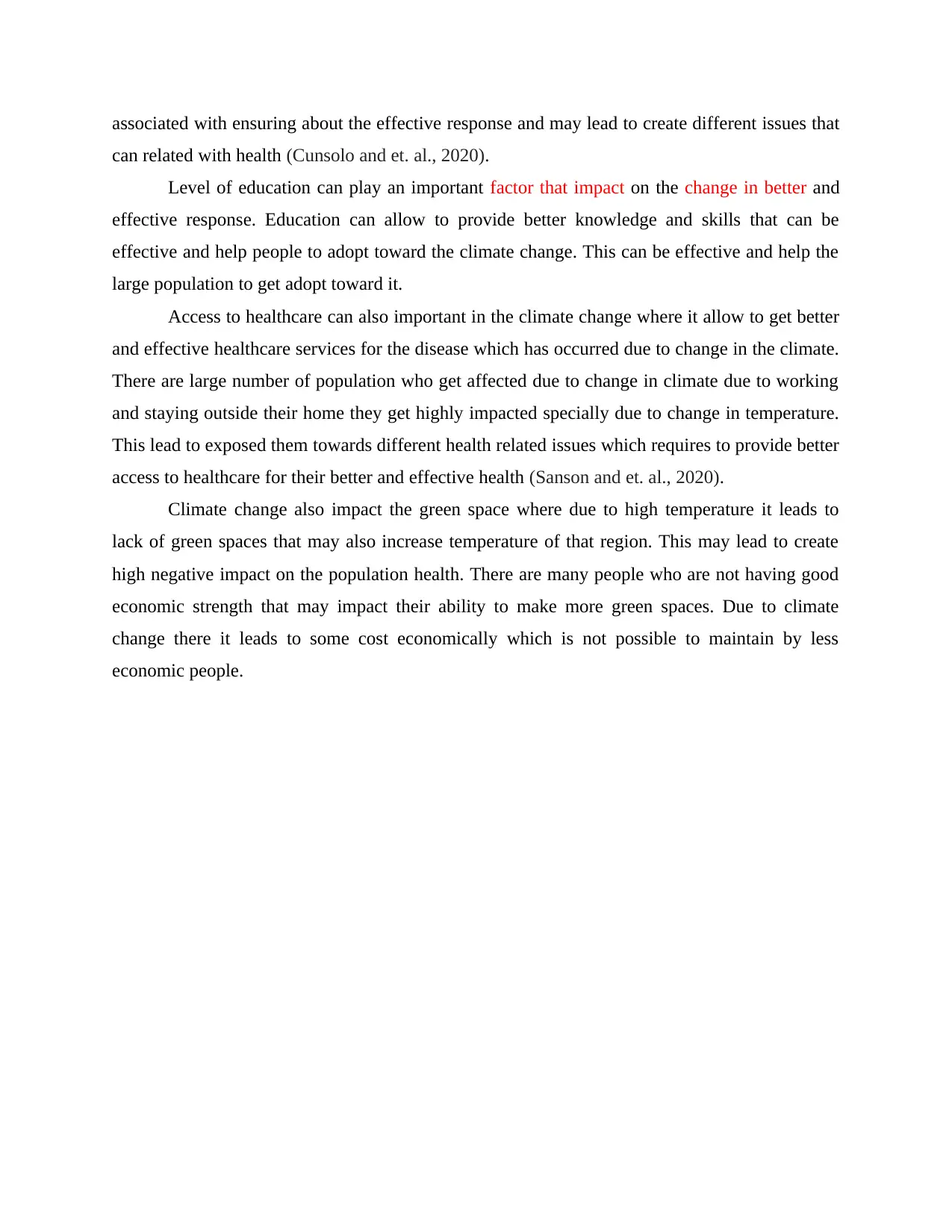
associated with ensuring about the effective response and may lead to create different issues that
can related with health (Cunsolo and et. al., 2020).
Level of education can play an important factor that impact on the change in better and
effective response. Education can allow to provide better knowledge and skills that can be
effective and help people to adopt toward the climate change. This can be effective and help the
large population to get adopt toward it.
Access to healthcare can also important in the climate change where it allow to get better
and effective healthcare services for the disease which has occurred due to change in the climate.
There are large number of population who get affected due to change in climate due to working
and staying outside their home they get highly impacted specially due to change in temperature.
This lead to exposed them towards different health related issues which requires to provide better
access to healthcare for their better and effective health (Sanson and et. al., 2020).
Climate change also impact the green space where due to high temperature it leads to
lack of green spaces that may also increase temperature of that region. This may lead to create
high negative impact on the population health. There are many people who are not having good
economic strength that may impact their ability to make more green spaces. Due to climate
change there it leads to some cost economically which is not possible to maintain by less
economic people.
can related with health (Cunsolo and et. al., 2020).
Level of education can play an important factor that impact on the change in better and
effective response. Education can allow to provide better knowledge and skills that can be
effective and help people to adopt toward the climate change. This can be effective and help the
large population to get adopt toward it.
Access to healthcare can also important in the climate change where it allow to get better
and effective healthcare services for the disease which has occurred due to change in the climate.
There are large number of population who get affected due to change in climate due to working
and staying outside their home they get highly impacted specially due to change in temperature.
This lead to exposed them towards different health related issues which requires to provide better
access to healthcare for their better and effective health (Sanson and et. al., 2020).
Climate change also impact the green space where due to high temperature it leads to
lack of green spaces that may also increase temperature of that region. This may lead to create
high negative impact on the population health. There are many people who are not having good
economic strength that may impact their ability to make more green spaces. Due to climate
change there it leads to some cost economically which is not possible to maintain by less
economic people.
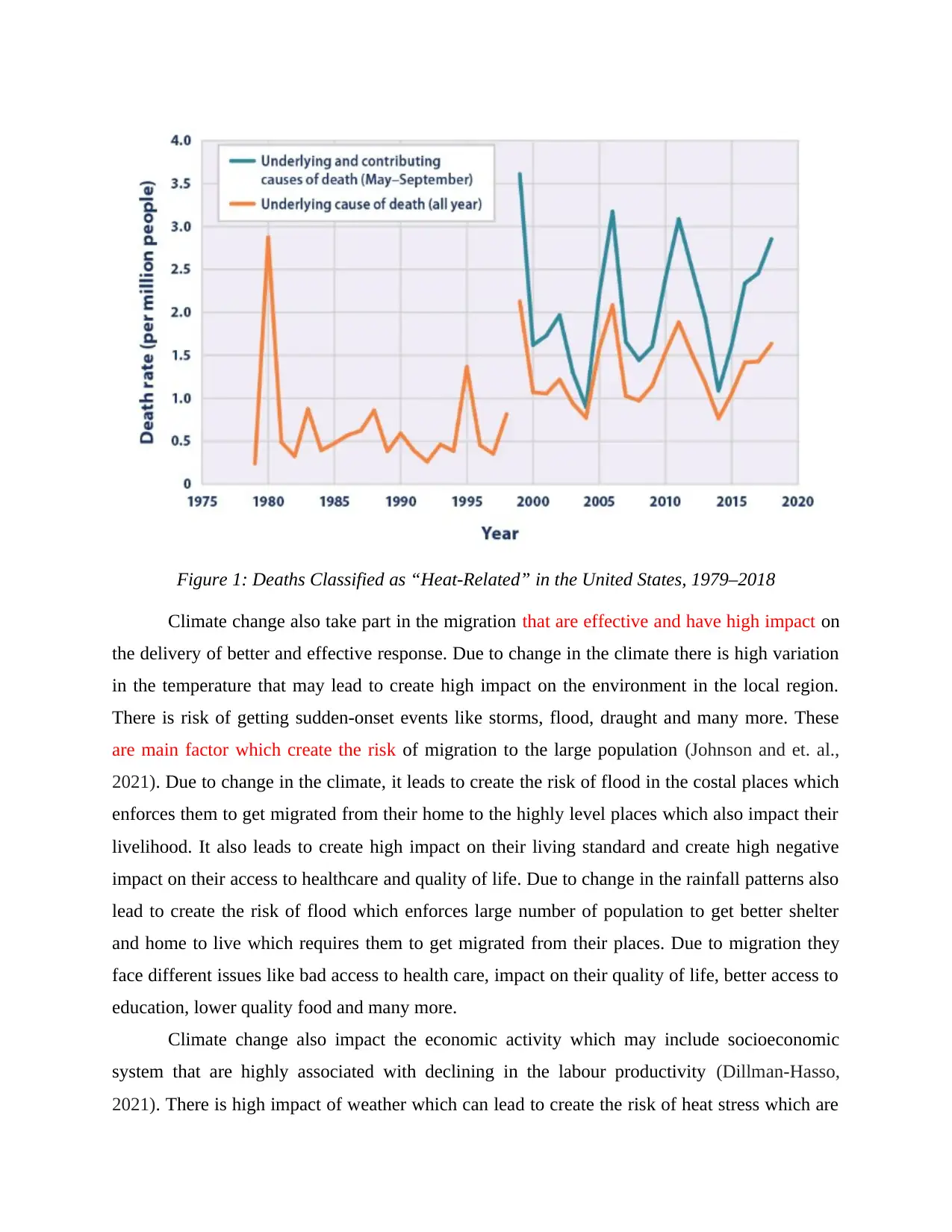
Figure 1: Deaths Classified as “Heat-Related” in the United States, 1979–2018
Climate change also take part in the migration that are effective and have high impact on
the delivery of better and effective response. Due to change in the climate there is high variation
in the temperature that may lead to create high impact on the environment in the local region.
There is risk of getting sudden-onset events like storms, flood, draught and many more. These
are main factor which create the risk of migration to the large population (Johnson and et. al.,
2021). Due to change in the climate, it leads to create the risk of flood in the costal places which
enforces them to get migrated from their home to the highly level places which also impact their
livelihood. It also leads to create high impact on their living standard and create high negative
impact on their access to healthcare and quality of life. Due to change in the rainfall patterns also
lead to create the risk of flood which enforces large number of population to get better shelter
and home to live which requires them to get migrated from their places. Due to migration they
face different issues like bad access to health care, impact on their quality of life, better access to
education, lower quality food and many more.
Climate change also impact the economic activity which may include socioeconomic
system that are highly associated with declining in the labour productivity (Dillman-Hasso,
2021). There is high impact of weather which can lead to create the risk of heat stress which are
Climate change also take part in the migration that are effective and have high impact on
the delivery of better and effective response. Due to change in the climate there is high variation
in the temperature that may lead to create high impact on the environment in the local region.
There is risk of getting sudden-onset events like storms, flood, draught and many more. These
are main factor which create the risk of migration to the large population (Johnson and et. al.,
2021). Due to change in the climate, it leads to create the risk of flood in the costal places which
enforces them to get migrated from their home to the highly level places which also impact their
livelihood. It also leads to create high impact on their living standard and create high negative
impact on their access to healthcare and quality of life. Due to change in the rainfall patterns also
lead to create the risk of flood which enforces large number of population to get better shelter
and home to live which requires them to get migrated from their places. Due to migration they
face different issues like bad access to health care, impact on their quality of life, better access to
education, lower quality food and many more.
Climate change also impact the economic activity which may include socioeconomic
system that are highly associated with declining in the labour productivity (Dillman-Hasso,
2021). There is high impact of weather which can lead to create the risk of heat stress which are
⊘ This is a preview!⊘
Do you want full access?
Subscribe today to unlock all pages.

Trusted by 1+ million students worldwide
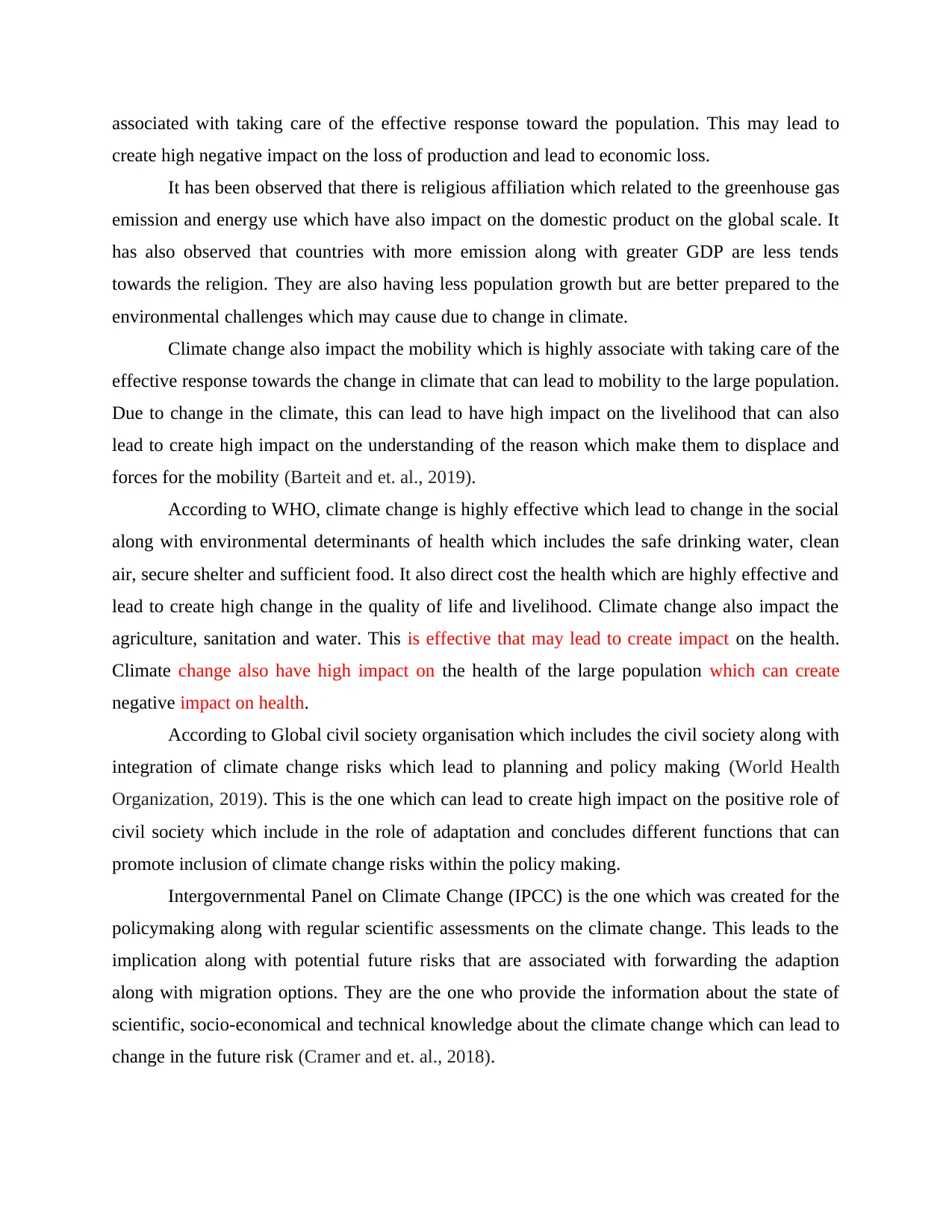
associated with taking care of the effective response toward the population. This may lead to
create high negative impact on the loss of production and lead to economic loss.
It has been observed that there is religious affiliation which related to the greenhouse gas
emission and energy use which have also impact on the domestic product on the global scale. It
has also observed that countries with more emission along with greater GDP are less tends
towards the religion. They are also having less population growth but are better prepared to the
environmental challenges which may cause due to change in climate.
Climate change also impact the mobility which is highly associate with taking care of the
effective response towards the change in climate that can lead to mobility to the large population.
Due to change in the climate, this can lead to have high impact on the livelihood that can also
lead to create high impact on the understanding of the reason which make them to displace and
forces for the mobility (Barteit and et. al., 2019).
According to WHO, climate change is highly effective which lead to change in the social
along with environmental determinants of health which includes the safe drinking water, clean
air, secure shelter and sufficient food. It also direct cost the health which are highly effective and
lead to create high change in the quality of life and livelihood. Climate change also impact the
agriculture, sanitation and water. This is effective that may lead to create impact on the health.
Climate change also have high impact on the health of the large population which can create
negative impact on health.
According to Global civil society organisation which includes the civil society along with
integration of climate change risks which lead to planning and policy making (World Health
Organization, 2019). This is the one which can lead to create high impact on the positive role of
civil society which include in the role of adaptation and concludes different functions that can
promote inclusion of climate change risks within the policy making.
Intergovernmental Panel on Climate Change (IPCC) is the one which was created for the
policymaking along with regular scientific assessments on the climate change. This leads to the
implication along with potential future risks that are associated with forwarding the adaption
along with migration options. They are the one who provide the information about the state of
scientific, socio-economical and technical knowledge about the climate change which can lead to
change in the future risk (Cramer and et. al., 2018).
create high negative impact on the loss of production and lead to economic loss.
It has been observed that there is religious affiliation which related to the greenhouse gas
emission and energy use which have also impact on the domestic product on the global scale. It
has also observed that countries with more emission along with greater GDP are less tends
towards the religion. They are also having less population growth but are better prepared to the
environmental challenges which may cause due to change in climate.
Climate change also impact the mobility which is highly associate with taking care of the
effective response towards the change in climate that can lead to mobility to the large population.
Due to change in the climate, this can lead to have high impact on the livelihood that can also
lead to create high impact on the understanding of the reason which make them to displace and
forces for the mobility (Barteit and et. al., 2019).
According to WHO, climate change is highly effective which lead to change in the social
along with environmental determinants of health which includes the safe drinking water, clean
air, secure shelter and sufficient food. It also direct cost the health which are highly effective and
lead to create high change in the quality of life and livelihood. Climate change also impact the
agriculture, sanitation and water. This is effective that may lead to create impact on the health.
Climate change also have high impact on the health of the large population which can create
negative impact on health.
According to Global civil society organisation which includes the civil society along with
integration of climate change risks which lead to planning and policy making (World Health
Organization, 2019). This is the one which can lead to create high impact on the positive role of
civil society which include in the role of adaptation and concludes different functions that can
promote inclusion of climate change risks within the policy making.
Intergovernmental Panel on Climate Change (IPCC) is the one which was created for the
policymaking along with regular scientific assessments on the climate change. This leads to the
implication along with potential future risks that are associated with forwarding the adaption
along with migration options. They are the one who provide the information about the state of
scientific, socio-economical and technical knowledge about the climate change which can lead to
change in the future risk (Cramer and et. al., 2018).
Paraphrase This Document
Need a fresh take? Get an instant paraphrase of this document with our AI Paraphraser
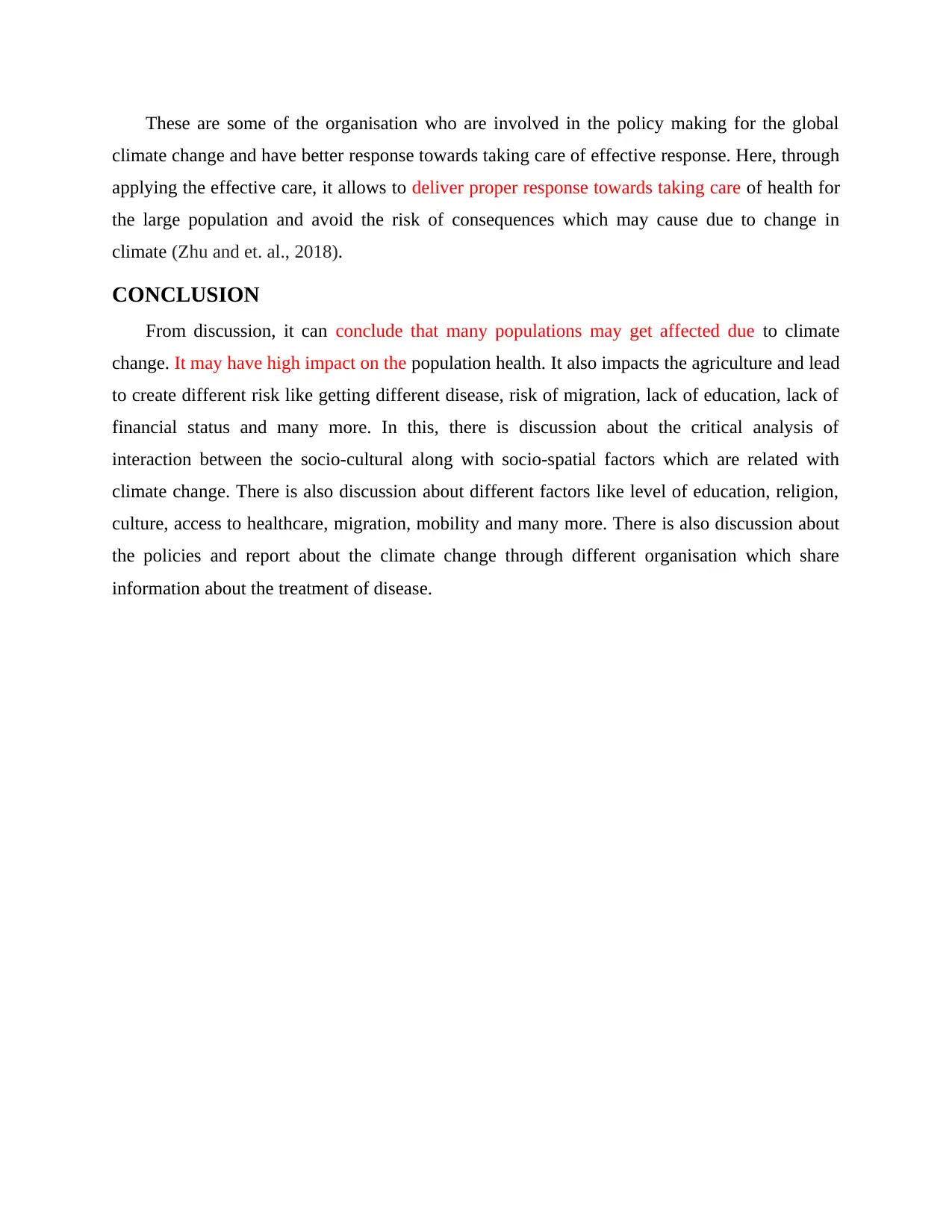
These are some of the organisation who are involved in the policy making for the global
climate change and have better response towards taking care of effective response. Here, through
applying the effective care, it allows to deliver proper response towards taking care of health for
the large population and avoid the risk of consequences which may cause due to change in
climate (Zhu and et. al., 2018).
CONCLUSION
From discussion, it can conclude that many populations may get affected due to climate
change. It may have high impact on the population health. It also impacts the agriculture and lead
to create different risk like getting different disease, risk of migration, lack of education, lack of
financial status and many more. In this, there is discussion about the critical analysis of
interaction between the socio-cultural along with socio-spatial factors which are related with
climate change. There is also discussion about different factors like level of education, religion,
culture, access to healthcare, migration, mobility and many more. There is also discussion about
the policies and report about the climate change through different organisation which share
information about the treatment of disease.
climate change and have better response towards taking care of effective response. Here, through
applying the effective care, it allows to deliver proper response towards taking care of health for
the large population and avoid the risk of consequences which may cause due to change in
climate (Zhu and et. al., 2018).
CONCLUSION
From discussion, it can conclude that many populations may get affected due to climate
change. It may have high impact on the population health. It also impacts the agriculture and lead
to create different risk like getting different disease, risk of migration, lack of education, lack of
financial status and many more. In this, there is discussion about the critical analysis of
interaction between the socio-cultural along with socio-spatial factors which are related with
climate change. There is also discussion about different factors like level of education, religion,
culture, access to healthcare, migration, mobility and many more. There is also discussion about
the policies and report about the climate change through different organisation which share
information about the treatment of disease.
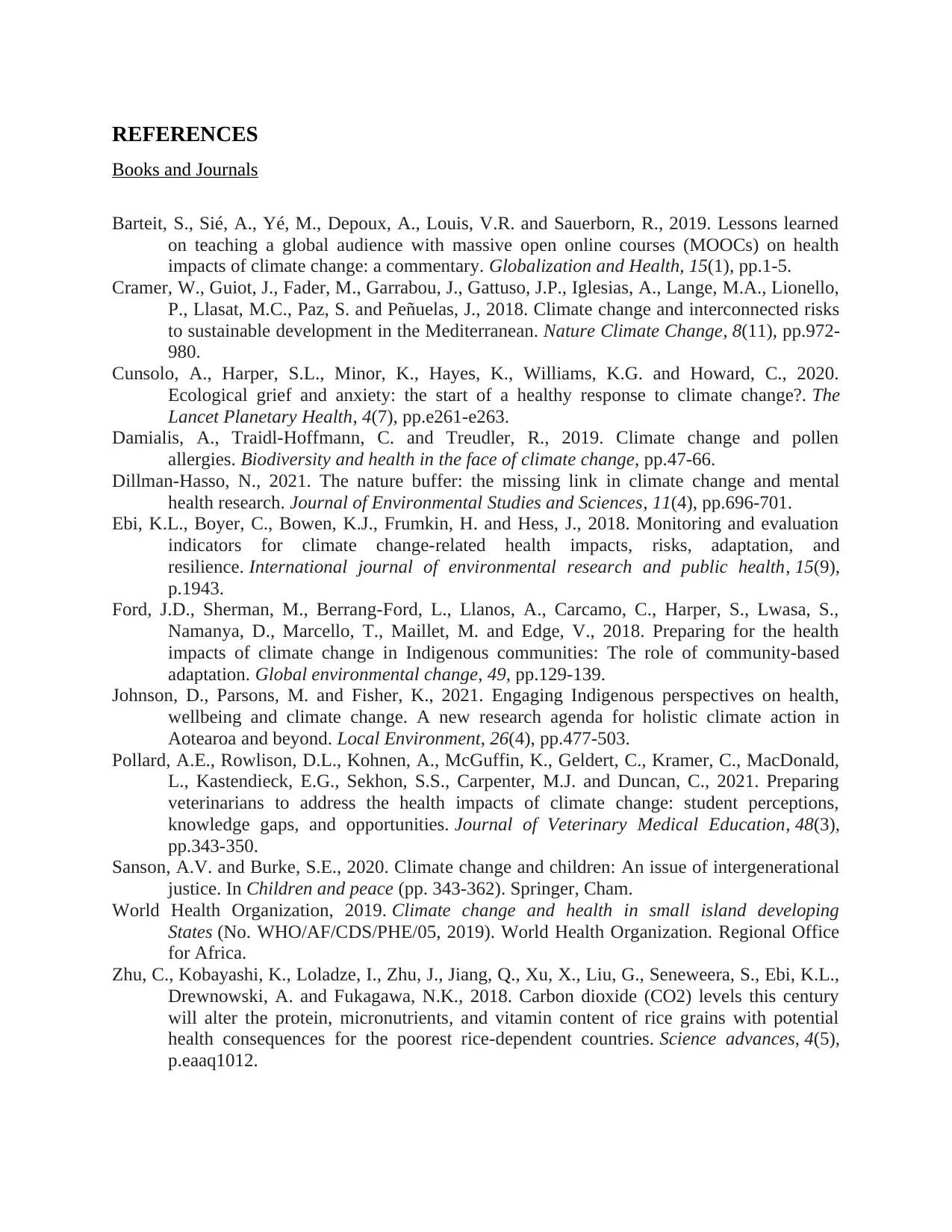
REFERENCES
Books and Journals
Barteit, S., Sié, A., Yé, M., Depoux, A., Louis, V.R. and Sauerborn, R., 2019. Lessons learned
on teaching a global audience with massive open online courses (MOOCs) on health
impacts of climate change: a commentary. Globalization and Health, 15(1), pp.1-5.
Cramer, W., Guiot, J., Fader, M., Garrabou, J., Gattuso, J.P., Iglesias, A., Lange, M.A., Lionello,
P., Llasat, M.C., Paz, S. and Peñuelas, J., 2018. Climate change and interconnected risks
to sustainable development in the Mediterranean. Nature Climate Change, 8(11), pp.972-
980.
Cunsolo, A., Harper, S.L., Minor, K., Hayes, K., Williams, K.G. and Howard, C., 2020.
Ecological grief and anxiety: the start of a healthy response to climate change?. The
Lancet Planetary Health, 4(7), pp.e261-e263.
Damialis, A., Traidl-Hoffmann, C. and Treudler, R., 2019. Climate change and pollen
allergies. Biodiversity and health in the face of climate change, pp.47-66.
Dillman-Hasso, N., 2021. The nature buffer: the missing link in climate change and mental
health research. Journal of Environmental Studies and Sciences, 11(4), pp.696-701.
Ebi, K.L., Boyer, C., Bowen, K.J., Frumkin, H. and Hess, J., 2018. Monitoring and evaluation
indicators for climate change-related health impacts, risks, adaptation, and
resilience. International journal of environmental research and public health, 15(9),
p.1943.
Ford, J.D., Sherman, M., Berrang-Ford, L., Llanos, A., Carcamo, C., Harper, S., Lwasa, S.,
Namanya, D., Marcello, T., Maillet, M. and Edge, V., 2018. Preparing for the health
impacts of climate change in Indigenous communities: The role of community-based
adaptation. Global environmental change, 49, pp.129-139.
Johnson, D., Parsons, M. and Fisher, K., 2021. Engaging Indigenous perspectives on health,
wellbeing and climate change. A new research agenda for holistic climate action in
Aotearoa and beyond. Local Environment, 26(4), pp.477-503.
Pollard, A.E., Rowlison, D.L., Kohnen, A., McGuffin, K., Geldert, C., Kramer, C., MacDonald,
L., Kastendieck, E.G., Sekhon, S.S., Carpenter, M.J. and Duncan, C., 2021. Preparing
veterinarians to address the health impacts of climate change: student perceptions,
knowledge gaps, and opportunities. Journal of Veterinary Medical Education, 48(3),
pp.343-350.
Sanson, A.V. and Burke, S.E., 2020. Climate change and children: An issue of intergenerational
justice. In Children and peace (pp. 343-362). Springer, Cham.
World Health Organization, 2019. Climate change and health in small island developing
States (No. WHO/AF/CDS/PHE/05, 2019). World Health Organization. Regional Office
for Africa.
Zhu, C., Kobayashi, K., Loladze, I., Zhu, J., Jiang, Q., Xu, X., Liu, G., Seneweera, S., Ebi, K.L.,
Drewnowski, A. and Fukagawa, N.K., 2018. Carbon dioxide (CO2) levels this century
will alter the protein, micronutrients, and vitamin content of rice grains with potential
health consequences for the poorest rice-dependent countries. Science advances, 4(5),
p.eaaq1012.
Books and Journals
Barteit, S., Sié, A., Yé, M., Depoux, A., Louis, V.R. and Sauerborn, R., 2019. Lessons learned
on teaching a global audience with massive open online courses (MOOCs) on health
impacts of climate change: a commentary. Globalization and Health, 15(1), pp.1-5.
Cramer, W., Guiot, J., Fader, M., Garrabou, J., Gattuso, J.P., Iglesias, A., Lange, M.A., Lionello,
P., Llasat, M.C., Paz, S. and Peñuelas, J., 2018. Climate change and interconnected risks
to sustainable development in the Mediterranean. Nature Climate Change, 8(11), pp.972-
980.
Cunsolo, A., Harper, S.L., Minor, K., Hayes, K., Williams, K.G. and Howard, C., 2020.
Ecological grief and anxiety: the start of a healthy response to climate change?. The
Lancet Planetary Health, 4(7), pp.e261-e263.
Damialis, A., Traidl-Hoffmann, C. and Treudler, R., 2019. Climate change and pollen
allergies. Biodiversity and health in the face of climate change, pp.47-66.
Dillman-Hasso, N., 2021. The nature buffer: the missing link in climate change and mental
health research. Journal of Environmental Studies and Sciences, 11(4), pp.696-701.
Ebi, K.L., Boyer, C., Bowen, K.J., Frumkin, H. and Hess, J., 2018. Monitoring and evaluation
indicators for climate change-related health impacts, risks, adaptation, and
resilience. International journal of environmental research and public health, 15(9),
p.1943.
Ford, J.D., Sherman, M., Berrang-Ford, L., Llanos, A., Carcamo, C., Harper, S., Lwasa, S.,
Namanya, D., Marcello, T., Maillet, M. and Edge, V., 2018. Preparing for the health
impacts of climate change in Indigenous communities: The role of community-based
adaptation. Global environmental change, 49, pp.129-139.
Johnson, D., Parsons, M. and Fisher, K., 2021. Engaging Indigenous perspectives on health,
wellbeing and climate change. A new research agenda for holistic climate action in
Aotearoa and beyond. Local Environment, 26(4), pp.477-503.
Pollard, A.E., Rowlison, D.L., Kohnen, A., McGuffin, K., Geldert, C., Kramer, C., MacDonald,
L., Kastendieck, E.G., Sekhon, S.S., Carpenter, M.J. and Duncan, C., 2021. Preparing
veterinarians to address the health impacts of climate change: student perceptions,
knowledge gaps, and opportunities. Journal of Veterinary Medical Education, 48(3),
pp.343-350.
Sanson, A.V. and Burke, S.E., 2020. Climate change and children: An issue of intergenerational
justice. In Children and peace (pp. 343-362). Springer, Cham.
World Health Organization, 2019. Climate change and health in small island developing
States (No. WHO/AF/CDS/PHE/05, 2019). World Health Organization. Regional Office
for Africa.
Zhu, C., Kobayashi, K., Loladze, I., Zhu, J., Jiang, Q., Xu, X., Liu, G., Seneweera, S., Ebi, K.L.,
Drewnowski, A. and Fukagawa, N.K., 2018. Carbon dioxide (CO2) levels this century
will alter the protein, micronutrients, and vitamin content of rice grains with potential
health consequences for the poorest rice-dependent countries. Science advances, 4(5),
p.eaaq1012.
⊘ This is a preview!⊘
Do you want full access?
Subscribe today to unlock all pages.

Trusted by 1+ million students worldwide
1 out of 9
Related Documents
Your All-in-One AI-Powered Toolkit for Academic Success.
+13062052269
info@desklib.com
Available 24*7 on WhatsApp / Email
![[object Object]](/_next/static/media/star-bottom.7253800d.svg)
Unlock your academic potential
Copyright © 2020–2025 A2Z Services. All Rights Reserved. Developed and managed by ZUCOL.





